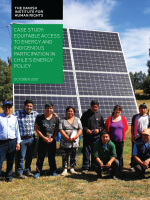
Case study: Equitable access to energy and indigenous participation in Chile's energy policy
With the need for decarbonising the energy matrix and reaching SDG 7 on access to affordable, reliable, sustainable and modern energy for all, it is becoming increasingly important to incorporate human rights of the most vulnerable population groups into national energy policies.
Based on field research in Isla Huapi, an island in the southern part of Chile, this case study about the photovoltaic electrification project in this island, provides an example of a project developed by and with participation of various Chilean stakeholders. Among these were the Chilean Ministry of Energy, the municipality of Futrono, a Chilean energy distribution company and the indigenous Mapuche Huilliche community that inhabits Isla Huapi. This indigenous community is one of the very last groups to have access to modern and safe energy in the district of Futrono, and the community demanded that the electrification be carried out using renewable energy and with an active role to be played by its beneficiaries.
The case study demonstrates that in its development, the Isla Huapi electrification project has included core elements of a human rights-based approach to the development and implementation of renewable energy, feeding into and applying Chile’s Energy roadmap 2018-2022 and Chile’s 2050 Energy Policy. Good practices and lessons learnt from this case study with regard to meaningful participation of indigenous peoples in energy development could serve as a model for and could be replicated in other countries and sectors.
The case study is available in English and Spanish.
We strive to make the pdf versions of our publications etc. accessible for screen readers. If you experience any problems, please contact Digital Editor Stine Juhl Nielsen on stni@humanrights.dk
